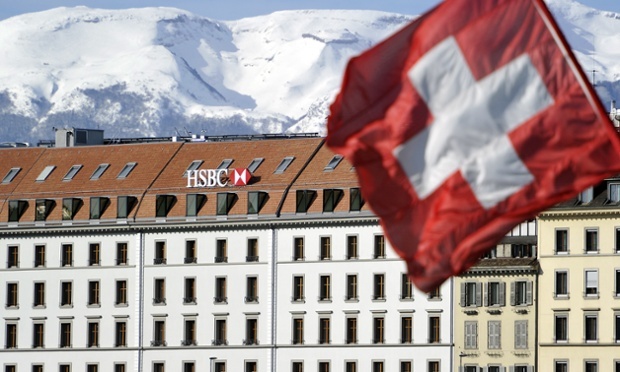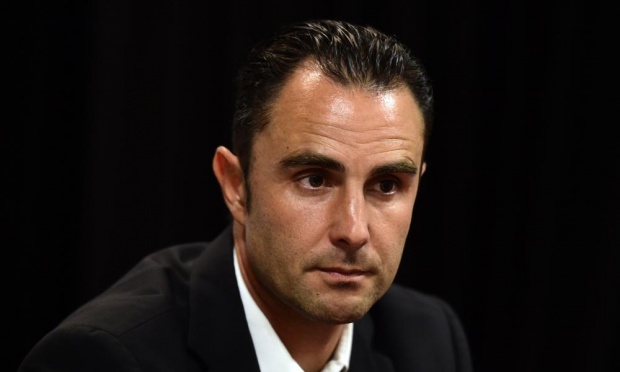HSBC Pays Out £28m over Money-Laundering Claims
CAPITALISM, 8 Jun 2015
Juliette Garside – The Guardian
Geneva prosecutor agrees to close investigation into HSBC in return for the financial settlement.

The penalty is the biggest ever imposed by the Geneva authorities. Photograph: Harold Cunningham/Getty
4 Jun 2015 – HSBC has been ordered to pay a record 40m Swiss francs (£28m) (US$43m) (€38m) and been given a final warning by the Geneva authorities for “organisational deficiencies” which allowed money laundering to take place in the bank’s Swiss subsidiary.
The settlement means the Swiss will not prosecute HSBC or publish the findings of their investigation into alleged aggravated money laundering. But Geneva’s chief prosecutor, Olivier Jornot, cautioned that the bank was on notice, saying: “This is an excuse which will only apply once.”
Announcing the biggest financial penalty ever imposed by the Geneva authorities, Jornot launched a stinging attack on his own country’s financial laws, adding his voice to a growing a number of Swiss politicians and campaigners calling for reform of the country’s secretive banking system.
How the story came to light – video:
“This matter shows the weakness of Swiss law in the matter of entry of criminal funds into the financial system,” said Jornot.
“When we have a law that doesn’t punish financial intermediaries accepting doubtful funds then we have a problem. This problem dates from long before the HSBC affair.”
HSBC agreed to the settlement after being notified of the charges being prepared against it at a private meeting on 10 April following which, prosecutors claimed, the bank rapidly agreed to begin negotiations over financial damages for past “illegal acts”.
The Geneva authorities said the payment, which is being described as “compensation” rather than a fine, reflected the harm done to the city and the profits obtained by HSBC from processing illicit funds.
The investigation was prompted, Jornot said, by revelations in the Guardian, the BBC, Le Monde and other media coordinated by the International Consortium of Investigative Journalists. This showed that HSBC’s Swiss arm banked the proceeds of political corruption and accepted deposits from arms dealers while helping wealthy people evade taxes.
On 18 February, Jornot ordered a raid on HSBC’s Geneva offices, a day after Switzerland’s federal prosecutor, Michael Lauber, had told the press there was no call for an inquiry into wrongdoing at the bank. Lauber had argued it was not appropriate for the state to launch an investigation into HSBC based on stolen information.
Wrongdoing at HSBC was exposed after an IT worker at the bank, Hervé Falciani, leaked details about its Swiss accounts. The documents ended up in the hands of the French government in December 2008 and were distributed to the tax authorities of other nations, including the UK, before being leaked to Le Monde.
HSBC’s Swiss arm is still facing investigations by US, French and Belgian authorities. Belgium said on Tuesday it was hoping to recover £390m in unpaid taxes from citizens who had hidden funds in undeclared Swiss accounts.
Meanwhile, Switzerland is pursuing Falciani. It has issued an international arrest warrant, but the French authorities have refused to extradite him. A Swiss court is preparing to try the Falciani in absentia.
Jornot’s investigators focused on HSBC’s compliance team, which was responsible for ensuring its bankers followed the law. They seized files and emails on some 20 customers and internal audits from 2004 to 2014.
The research focused on four money laundering cases: one involving sales of cannabis, another concerning merchandise from Chinese triad counterfeiters in Spain, and a third involving an unnamed Mexican “well known to certain cartels”. The fourth case had been exposed by the Swissleaks investigation, coordinated by the International Consortium of Investigative Journalists.
The evidence was enough for the Swiss authorities to conclude that “organisational failings” at the bank were to blame for money-laundering violations.
The settlement does not cover employees. At the press conference, prosecutors referenced a former HSBC manager, Judah el-Maleh, who is believed to have fled to Israel. He ran HSBC Suisse’s Mediterranean, Europe and Israel desk, which was shut down after claims it had been involved in a cash pipeline in which money from the sale of marijuana in the Paris suburbs was couriered to HSBC’s respectable clients in the French capital. Bank accounts back in Switzerland were manipulated to reimburse the drug dealers.
In a statement, HSBC said: “The investigation conducted by the public prosecutor of the canton of Geneva into HSBC Private Bank (Suisse) has been formally closed today. The investigation found that neither the bank nor its employees are suspected of any current criminal offences.

Hervé Falciani leaked details about Swiss accounts that ended up in the hands of the French government. Photograph: Gerard Julien/AFP/Getty Images
“The Geneva prosecutor acknowledges the progress the bank has made in recent years, including the improvements in its compliance function, internal processes and technology.”
HSBC claims to have undergone a radical transformation, with initiatives designed to prevent its banking services being used to evade taxes or launder money. The repositioning has reduced its client base by almost 70%, from about 30,000 accounts in 2007 to some 10,000 in 2014.
Explaining the decision not to bring HSBC to court, Jornot said Swiss law demanded a high standard of proof. Those laundering money had to be shown to be doing so deliberately, not accidentally, and the money had to be demonstrably obtained from criminal acts, not simply deposited by a known criminal. To fine the bank, prosecutors would also have needed to show organisational failure caused the money to be laundered.
In addition, many of the revelations in Falciani’s data, which gave a detailed picture of events at the bank between 2005 and 2007, concerned older accounts or people who were no longer clients of the bank.
Nonetheless, Jornot stressed that the evidence showed “HSBC has suffered from organisational failings which were to blame for the money laundering which occurred”.
__________________________
More:
HSBC’s Swiss compensation – not much for the bank but a big deal for Geneva. Chief prosecutor for canton’s decision to investigate despite inaction by other Swiss regulators shows power struggle within establishment.
HSBC: Swiss bank searched as officials launch money-laundering inquiry. Investigation into suspected ‘aggravated money laundering’ comes after Belgium and France begin scrutinising tax affairs of Europe’s biggest bank.
Go to Original – theguardian.com
DISCLAIMER: The statements, views and opinions expressed in pieces republished here are solely those of the authors and do not necessarily represent those of TMS. In accordance with title 17 U.S.C. section 107, this material is distributed without profit to those who have expressed a prior interest in receiving the included information for research and educational purposes. TMS has no affiliation whatsoever with the originator of this article nor is TMS endorsed or sponsored by the originator. “GO TO ORIGINAL” links are provided as a convenience to our readers and allow for verification of authenticity. However, as originating pages are often updated by their originating host sites, the versions posted may not match the versions our readers view when clicking the “GO TO ORIGINAL” links. This site contains copyrighted material the use of which has not always been specifically authorized by the copyright owner. We are making such material available in our efforts to advance understanding of environmental, political, human rights, economic, democracy, scientific, and social justice issues, etc. We believe this constitutes a ‘fair use’ of any such copyrighted material as provided for in section 107 of the US Copyright Law. In accordance with Title 17 U.S.C. Section 107, the material on this site is distributed without profit to those who have expressed a prior interest in receiving the included information for research and educational purposes. For more information go to: http://www.law.cornell.edu/uscode/17/107.shtml. If you wish to use copyrighted material from this site for purposes of your own that go beyond ‘fair use’, you must obtain permission from the copyright owner.